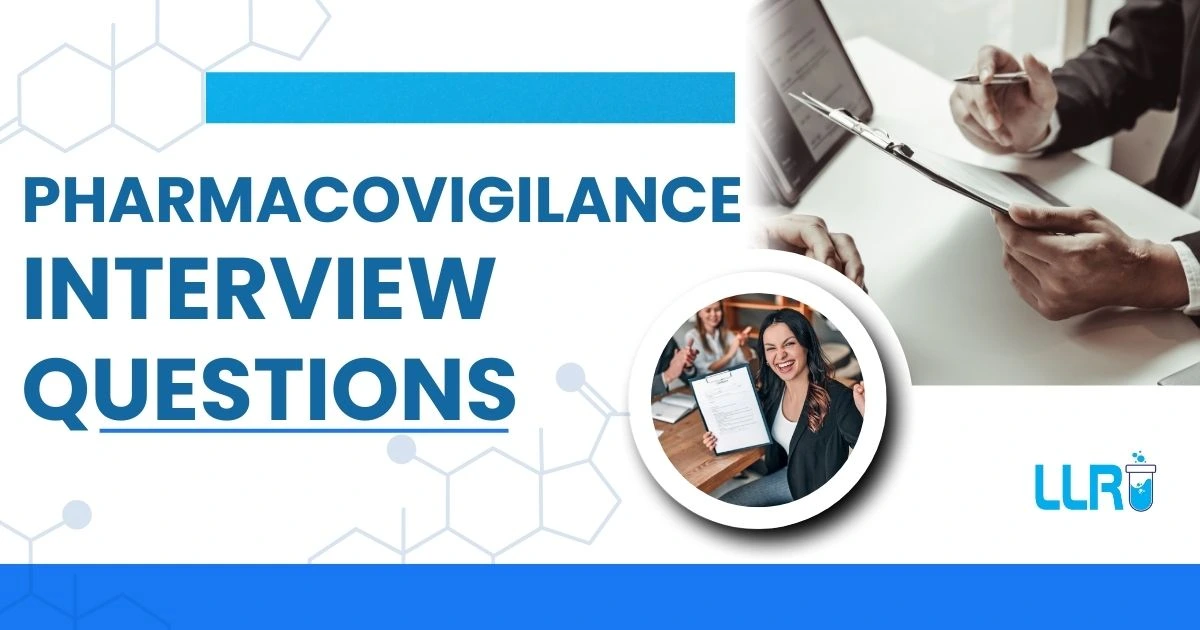Pharmacovigilance Interview Questions: So, you’ve sent your resume to a few pharma companies and finally landed that pharmacovigilance interview. Great! But now the real question—how do you prepare? Don’t worry, we’ve got your back.
In this blog, we’ll walk through the most frequently asked questions in pharmacovigilance interviews, including tailored ones for freshers and experienced professionals. You’ll also find answers explained in a simple, direct way, tips on how to prepare for pharmacovigilance interviews, and even training suggestions from Clinical Research Institutes like Learning Labb Research Institute (LLRI).
Let’s get you interview-ready!

What Is Pharmacovigilance, Really?
Before jumping into interview mode, let’s quickly define it. Pharmacovigilance is the science and activity relating to the detection, assessment, understanding, and prevention of adverse effects or any other drug-related problems.
Basically, it’s making sure medicines are safe after they’ve hit the market.
“The aim of pharmacovigilance is to improve patient care and safety in relation to the use of medicines.” – World Health Organization
Why Interviewers Ask What They Ask
Interviewers don’t just want textbook definitions – do not make this mistake please. They want to know:
- Do you understand real-world pharmacovigilance work?
- Can you think critically and act quickly?
- Do you have attention to detail?
- Are you trained or certified?
Top Pharmacovigilance Interview Questions with Answers
Let’s break it down for both freshers and experienced candidates.
Pharmacovigilance Interview Questions for Freshers
Q1: What is pharmacovigilance?
Answer: Pharmacovigilance is the science of monitoring the effects of medical drugs after they have been licensed for use. It helps in identifying previously unreported adverse drug reactions and promotes safer use of medications.
Q2: What is an Adverse Drug Reaction (ADR)?
Answer: An ADR is a harmful or unpleasant reaction resulting from the use of a medicinal product at normal doses. It can range from mild rashes to severe life-threatening effects.
Q3: What is the difference between ADR and AE?
Answer: An Adverse Event (AE) is any untoward medical occurrence during treatment, whether or not related to the drug. ADR is a type of AE that’s directly related to the drug’s action.
Q4: What are the main types of pharmacovigilance reports?
Answer:
- Spontaneous reports
- Periodic Safety Update Reports (PSURs)
- Individual Case Safety Reports (ICSRs)
- Development Safety Update Reports (DSURs)
Q5: Why do you want to work in pharmacovigilance?
Answer: Because it’s a growing field with meaningful impact. It allows me to use my scientific knowledge to improve patient safety and gain a long-term career in the pharmaceutical industry.

Pharmacovigilance Interview Questions and Answers for Experienced Candidates
Q1: How do you assess the causality of an adverse event?
Answer: Using causality assessment methods like the WHO-UMC system or Naranjo Algorithm, we look at factors like time relationship, dechallenge/rechallenge, alternative causes, and existing evidence.
Q2: What databases have you worked on?
Answer: I’ve worked with Argus Safety, ArisG, and Oracle AERS, depending on the company. Familiarity with these tools helps with faster data entry, case processing, and compliance.
Q3: Explain the difference between PSUR and DSUR.
Answer: PSURs are required post-marketing to evaluate benefit-risk over time, whereas DSURs are submitted during clinical trials to provide safety updates annually.
Q4: What do you do if an AE is not serious but unexpected?
Answer: Even non-serious and unexpected AEs should be reported and evaluated to see if there’s a trend that could indicate a broader safety concern.
Q5: How do you stay updated in pharmacovigilance?
Answer: By attending webinars, reading WHO updates, and taking courses from institutions like LLRI, which offers advanced training in pharmacovigilance and clinical research.
Sometimes, interviewers can throw you a curveball. Here are some situational questions.
Q: A healthcare provider reports an ADR but forgets the patient’s name. What do you do?
A: Try to retrieve the missing information through follow-up. If not possible, report the ADR as a valid case if at least three essential elements are present: identifiable reporter, identifiable patient, suspect product, and reaction.
Q: You receive two reports of the same case from different sources. What next?
A: Perform duplicate check using patient initials, date of birth, and reaction details. Merge reports to avoid overreporting.

How to Prepare for Pharmacovigilance Interview
Now, let’s talk strategy. Preparation isn’t just about mugging definitions. Here’s what works:
1. Get Trained from a Good Clinical Research Institute
A Clinical Research Training Center like Learning Labb Research Institute (LLRI) offers a structured Clinical Research Course with hands-on pharmacovigilance modules.
2. Brush Up on Terminologies and Guidelines
- MedDRA
- ICH E2E
- WHO-ART
- CIOMS Form
3. Practice with Pharmacovigilance Interview Questions
Go through this list multiple times. Rehearse answers aloud. Mock interviews help you get comfortable.
4. Be Ready With Examples
Don’t just say, “I know pharmacovigilance.” Say, “At my last internship, I processed 20 ICSRs using Argus and helped submit two PSURs.”
Questions to Ask the Interviewer
Yes, ask something! It shows you’re serious.
- What tools does your pharmacovigilance team use?
- How is the team structured?
- What training is provided post-hiring?
Want to Upskill Before Your Interview?
Consider enrolling in courses from LLRI or similar institutes. They offer:
- PG Diploma in Clinical Research
- Affordable Clinical Research Course Fees
- Certifications in pharmacovigilance
- Placement assistance
It’s known as one of the Best Institutes for PG Diploma in Clinical Research in India.
Visit: www.llri.in for course details and admission.
Recap Before You Walk In That Interview Room
Let’s quickly go over it all:
- Know the pharmacovigilance interview questions by heart.
- Understand the basics and real-life applications.
- Take proper training from a clinical research training center like LLRI.
- Prepare examples from internships or coursework.
- Ask smart questions during the interview.

Still Nervous?
Here’s a simple thought:
“Success is where preparation and opportunity meet.” – Bobby Unser
Keep revising, stay confident, and walk in like you belong. Because you do.
On A Final Note…
Interviews can be tricky, but when you’re armed with the right pharmacovigilance interview questions, backed by real answers and proper training, you’re already ahead of the game.
Get trained. Get prepared. And walk in ready to ace it.

